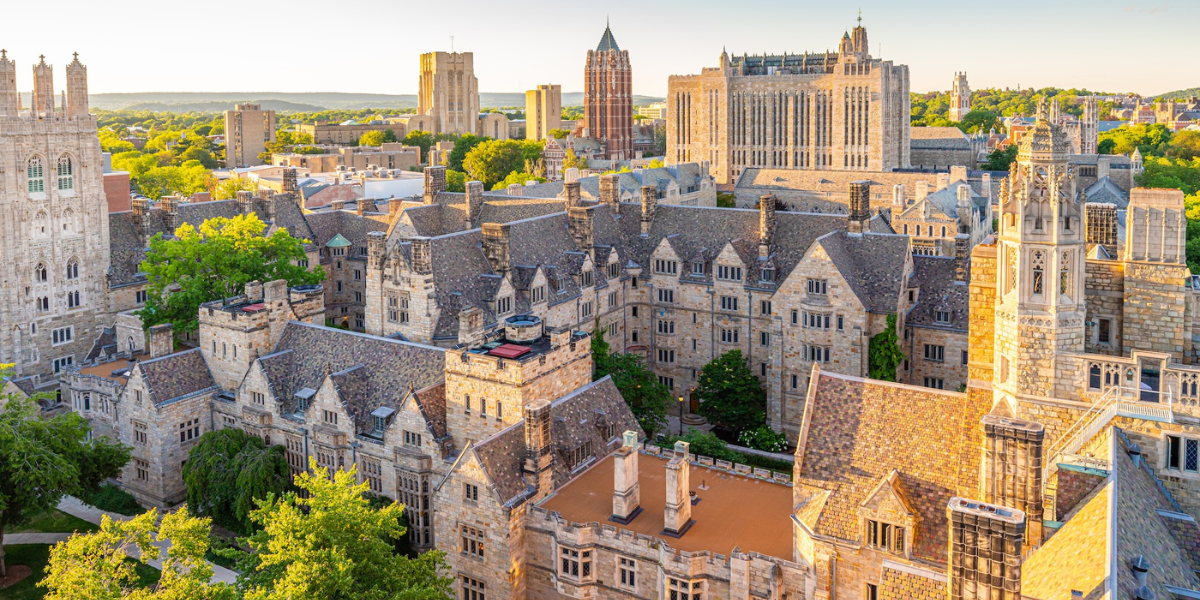American View
Despite the Angst, We’re Not Crossing Schools Off the List

As the climate on some campuses has turned threatening for Jewish students, we share essays from moms with kids at Yale, Northwestern and Brown. We also hear from a mother whose high school junior encountered protests on a recent tour of the University of Texas at Austin and from another whose son has decided to forego problematic schools like Middlebury.
As the mother of two kids in college and one approaching her senior year of high school, I have a new (unpaid) job: I assiduously track the campus unrest at my older children’s universities, toggling between their college newspapers, their campus Hillel updates and each college’s respective social media group for Jewish parents that was hastily created post-October 7.
The power and pitfall of all this screentime is such that I typically know what’s happening on my kids’ campuses—Yale and Washington University in St. Louis—before they do. Within minutes of incidents large and small, a parent posts a video: Here are some anti-Israel protesters disrupting WashU’s accepted students day; there is a crown jewel of Yale’s campus—a building named for a Jewish donor—with most of its eponymous letters strategically plied off so that it reads “War Center.”
To say that my and my youngest child’s thoughts about where she should apply have been affected by the current campus climate is an understatement. It is practically all I think about, especially since I have a front-row seat to what is happening on my older kids’ campuses.
In the past seven months, I have heard many Jewish parents say, “I would never send my child to the Ivy League.” But as we’ve seen recently, Ivy League schools don’t have a monopoly on anti-Israel protests. Cal Poly Humboldt, nestled in the redwoods of Northern California, is all the way across the country from the Ivy League. Compared to Columbia’s Jewish population of 1,500, or 22 percent, Cal Poly Humboldt has just 150 Jewish students, or 2 percent. And yet they had one of the most entrenched campus protests. In other words, anti-Israel sentiment is everywhere.
My husband and I met and fell in love in Israel. We gave our children Hebrew names, which means they can’t obscure their Jewish identities even if they tried. With that in mind, what is the “right” school for them these days? I think the right school is one where they don’t feel compelled to hide who they are to fit in. And I believe that hinges more on the people they choose to surround themselves with than the actual school itself. One of my son’s best friends at Yale is a Jordanian Arab. Their friendship has been stretched like silly putty and challenged over the past seven months, but isn’t that the hallmark of the strongest of relationships?
My high school junior’s parameters for her college search haven’t really changed; rather, the chaos on campuses has only confirmed her priorities. She wants to attend a school that has a robust Jewish population, not because of a safety-in-numbers internal calculation but because Jews are her people, her community. She knew that before October 7, and she knows that now. Even at 16, she recognizes the saw-you-at-Sinai sense of camaraderie she feels when in the company of other Jewish teens.
There will always be people who make us question who we are and why we believe the things we do. I don’t think that’s a bad thing. The purpose of college is to learn how to become a better thinker. That doesn’t happen if students cocoon themselves within a cluster of people who all share the same opinions.
For that reason, crossing schools off my daughter’s list feels like the wrong approach. That choice shortchanges her; it doesn’t hurt the college in question. The truth is that many colleges deemed desirable by students have no shortage of applicants. Steering my Jewish student away from a campus that has had its share of protests feels like playing directly into the hands of people who don’t want Jews on campus.
“Jews can’t afford to abandon these schools,” said Ron Hassner, who rose to national prominence as the University of California, Berkeley, professor who hunkered down in his office for two weeks to draw attention to what he saw as the university’s unwillingness to keep Jewish students safe. In a Zoom conversation with Tablet magazine, he said, “Are we 19th-century Eastern European Jews who run from shtetl to shtetl as the Cossacks chase us? We’re not—we’re confident, we’re proud.”
I hope my children remain proud but not so proud that they can’t listen to and wrestle with divergent opinions. I hope they surround themselves with people who value and honor dialogue, who value and honor them for who they are. And I hope this extends to their lives far beyond their years in college.
Bonnie Rochman is a health and science writer and former parenting columnist for Time magazine.










 Facebook
Facebook Instagram
Instagram Twitter
Twitter
Carol Sindell says
How wonderful that you wrote such a beautiful thought-provoking article?
Continue writing and spreading the message
Judy Rochman says
So we’ll written and so well thought out!
I totally share her thoughts!
Alan J Salzberg says
Voting with your feet is the right thing to do. Crossing Columbia and the most virulent schools off won’t deny your child the opportunity to face antisemitism. And it will harm the schools. If applications drop admit rate goes up and the schools prestige falls
Ellen Stiller Jarrett says
Excellent piece of work, Bonnie!
Teresa Reinhart says
That’s fine if studying the sciences but from what I hear, the calibre of studies in the humanities has been negatively impacted by DEI ideology. Why would anyone pay so much to be subjected to that nonsense? .